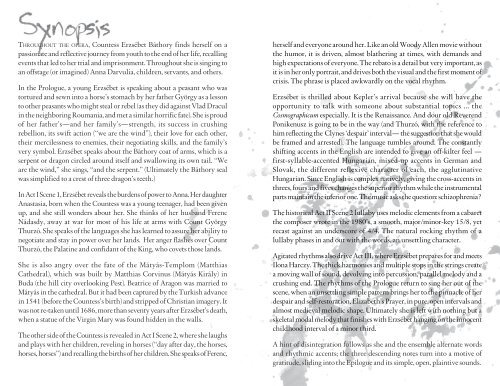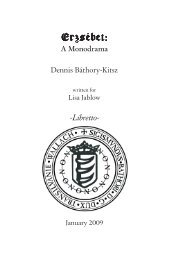Bolder Sounds 20 years of creative sample libraries - Báthory Erzsébet
Bolder Sounds 20 years of creative sample libraries - Báthory Erzsébet
Bolder Sounds 20 years of creative sample libraries - Báthory Erzsébet
You also want an ePaper? Increase the reach of your titles
YUMPU automatically turns print PDFs into web optimized ePapers that Google loves.
THROUGHOUT THE OPERA, Countess <strong>Erzsébet</strong> <strong>Báthory</strong> finds herself on a<br />
passionate and reflective journey from youth to the end <strong>of</strong> her life, recalling<br />
events that led to her trial and imprisonment. Throughout she is singing to<br />
an <strong>of</strong>fstage (or imagined) Anna Darvulia, children, servants, and others.<br />
In the Prologue, a young <strong>Erzsébet</strong> is speaking about a peasant who was<br />
tortured and sewn into a horse’s stomach by her father György as a lesson<br />
to other peasants who might steal or rebel (as they did against Vlad Dracul<br />
in the neighboring Roumania, and met a similar horrific fate). She is proud<br />
<strong>of</strong> her father’s—and her family’s—strength, its success in crushing<br />
rebellion, its swift action (“we are the wind”), their love for each other,<br />
their mercilessness to enemies, their negotiating skills, and the family’s<br />
very symbol. <strong>Erzsébet</strong> speaks about the <strong>Báthory</strong> coat <strong>of</strong> arms, which is a<br />
serpent or dragon circled around itself and swallowing its own tail. “We<br />
are the wind,” she sings, “and the serpent.” (Ultimately the <strong>Báthory</strong> seal<br />
was simplified to a crest <strong>of</strong> three dragon’s teeth.)<br />
In Act I Scene 1, <strong>Erzsébet</strong> reveals the burdens <strong>of</strong> power to Anna. Her daughter<br />
Anastasia, born when the Countess was a young teenager, had been given<br />
up, and she still wonders about her. She thinks <strong>of</strong> her husband Ferenc<br />
Nádasdy, away at war for most <strong>of</strong> his life at arms with Count György<br />
Thurzó. She speaks <strong>of</strong> the languages she has learned to assure her ability to<br />
negotiate and stay in power over her lands. Her anger flashes over Count<br />
Thurzó, the Palatine and confidant <strong>of</strong> the King, who covets those lands.<br />
She is also angry over the fate <strong>of</strong> the Mátyás-Templom (Matthias<br />
Cathedral), which was built by Matthias Corvinus (Mátyás Király) in<br />
Buda (the hill city overlooking Pest). Beatrice <strong>of</strong> Aragon was married to<br />
Mátyás in the cathedral. But it had been captured by the Turkish advance<br />
in 1541 (before the Countess’s birth) and stripped <strong>of</strong> Christian imagery. It<br />
was not re-taken until 1686, more than seventy <strong>years</strong> after <strong>Erzsébet</strong>’s death,<br />
when a statue <strong>of</strong> the Virgin Mary was found hidden in the walls.<br />
The other side <strong>of</strong> the Countess is revealed in Act I Scene 2, where she laughs<br />
and plays with her children, reveling in horses (“day after day, the horses,<br />
horses, horses”) and recalling the births <strong>of</strong> her children. She speaks <strong>of</strong> Ferenc,<br />
herself and everyone around her. Like an old Woody Allen movie without<br />
the humor, it is driven, almost blathering at times, with demands and<br />
high expectations <strong>of</strong> everyone. The rebato is a detail but very important, as<br />
it is in her only portrait, and drives both the visual and the first moment <strong>of</strong><br />
crisis. The phrase is placed awkwardly on the vocal rhythm.<br />
<strong>Erzsébet</strong> is thrilled about Kepler’s arrival because she will have the<br />
opportunity to talk with someone about substantial topics ... the<br />
Cosmographicum especially. It is the Renaissance. And dour old Reverend<br />
Ponikenusz is going to be in the way (and Thurzó, with the reference to<br />
him reflecting the Clynes ‘despair’ interval— the suggestion that she would<br />
be framed and arrested). The language tumbles around. The constantly<br />
shifting accents in the English are intended to give an <strong>of</strong>f-kilter feel —<br />
first-syllable-accented Hungarian, mixed-up accents in German and<br />
Slovak, the different reflexive character <strong>of</strong> each, the agglutinative<br />
Hungarian. Since English is complex natively, giving the cross-accents in<br />
threes, fours and fives changes the superior rhythm while the instrumental<br />
parts maintain the inferior one. The music asks the question: schizophrenia?<br />
The historical Act II Scene 2 lullaby uses melodic elements from a cabaret<br />
the composer wrote in the 1980’s, a smooth, major/minor-key 15/8, yet<br />
recast against an underscore <strong>of</strong> 4/4. The natural rocking rhythm <strong>of</strong> a<br />
lullaby phases in and out with the words, an unsettling character.<br />
Agitated rhythms also drive Act III, where <strong>Erzsébet</strong> prepares for and meets<br />
Ilona Harczy. The thick harmonies and multiple stops in the strings create<br />
a moving wall <strong>of</strong> sound, devolving into percussion, parallel melody and a<br />
crushing end. The rhythms <strong>of</strong> the Prologue return to sing her out <strong>of</strong> the<br />
scene, when an unsettling simple pattern brings her to the pinnacle <strong>of</strong> her<br />
despair and self-restoration, Elizabeth’s Prayer, in pure, open intervals and<br />
almost medieval melodic shape. Ultimately she is left with nothing but a<br />
skeletal modal melody that finishes with <strong>Erzsébet</strong> hanging on the innocent<br />
childhood interval <strong>of</strong> a minor third.<br />
A hint <strong>of</strong> disintegration follows as she and the ensemble alternate words<br />
and rhythmic accents; the three descending notes turn into a motive <strong>of</strong><br />
gratitude, sliding into the Epilogue and its simple, open, plaintive sounds.



